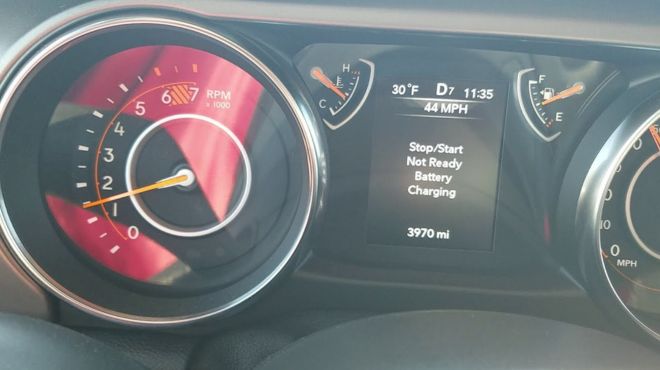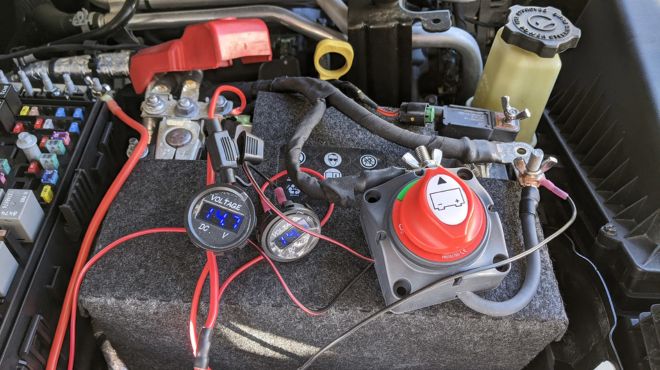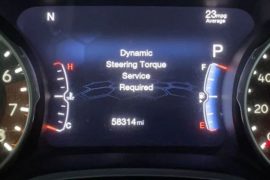Stop Start Not Ready Battery Charging message is a common issue if you own a recent Jeep model like 2019 or 2020 Wrangler or Gladiator. The factory-installed main and auxiliary batteries in these vehicles tend to be the reason behind the problem, so it’s common for them to become depleted or die prematurely. This triggers the warning light, though other factors like a malfunctioning sensor, insufficient charging time, or driving habits can also be to blame. But in most cases, the root cause stems from weak OEM batteries that can’t handle the demands of the Stop Start system.

Stick with me as I walk through why you might be seeing this message, some common problems that cause it, and what you can do to fix it. Whether it’s replacing a part or changing your driving habits, I’ll give you the inside scoop so you can clear that pesky warning message and get better gas mileage. Sound good? Alright, let’s figure this thing out together!
What Does This “Not Ready Battery Charging” Message Mean?
Let’s start by breaking down what that warning message is trying to tell you.
The Stop/Start system relies on something called the Energy Storage System (ESS) to function. I know, it sounds high-tech but it’s pretty simple – it’s just a fancy name for your Jeep’s battery system.
For the Stop/Start technology to work its magic, the ESS batteries need to be fully charged. When you turn off the engine at a stoplight, the ESS system kicks in to restart it when you lift your foot off the brake. But if your batteries aren’t charged up enough, the system can’t reliably restart your Jeep.
That’s where the “Not Ready Battery Charging” warning comes in. It’s your Jeep’s way of saying “Hey there, my batteries need a bit more time to charge before I can use the Stop/Start system.”
The bottom line is that this message indicates your battery system isn’t quite ready to handle the demands of automatically stopping and restarting your engine. It needs more time connected to a charging source to get back up to full power.
It’s kind of like when your phone gives you that annoying “Low Battery” warning when the charge is getting depleted. Your Jeep is essentially telling you the same thing about its battery system. Time to give those batteries some juice!
Common Causes and Solutions Jeep Say Stop/Start Not Ready Battery Charging Issue
1. Faulty Main or Auxiliary Battery
Now that you know what the message means, let’s talk about some of the most common issues that cause your Jeep to give you the dreaded “Not Ready” warning.
One of the biggest culprits is a battery that’s on its last legs. Your Jeep has both a main and auxiliary battery that work together to power the vehicle’s systems. Over time, they naturally lose their abilty to hold a charge.
Extreme hot or cold weather can speed up the deterioration process. The average battery lasts around 3-5 years, so you may simply be due for a replacement if yours is older.
If one or both of your Jeep’s batteries are no longer in good health, the Stop/Start system won’t have enough juice to operate.
Troubleshooting tip – If your Jeep struggles to start or you notice dimming headlights, it’s very likely the batteries are worn out.
The good news is this is an easy fix. You can have the batteries tested at your dealership or most auto parts stores and repair shops. They’ll be able to check if either one is no longer capable of holding a proper charge.
If so, simply replacing the faulty main or auxiliary battery with a new one should get your Stop/Start system up and running again. Just be sure to get one that meets your Jeep’s specifications.

2. Malfunctioning Intelligent Battery Sensor (IBS)
Another sneaky culprit for the “Not Ready Battery Charging” alert is a flaky Intelligent Battery Sensor. Say what now?
Your Jeep has a smart sensor that monitors the charge level of your batteries. It’s called the Intelligent Battery Sensor or IBS for short.
Over time, the IBS can get confused about the proper voltage levels for your batteries. When this happens, it may incorrectly report they need more charging time even when fully charged.
Luckily, you can often reset the IBS to relearn the correct baseline charge measurements. The fix is simple – just restart your Jeep’s engine multiple times to allow the sensor to recalibrate.
Turn the ignition on and off about 5 times in a row. This forces the IBS to do a hard reset to factory settings. Once it relearns the normal voltage range, the faulty “Not Ready” alerts should stop.
If the warning message persists after resetting the IBS, there may be a deeper issue with the sensor itself malfunctioning. At that point it’s best to have a mechanic diagnose and potentially replace the faulty component.
But try the reset first – there’s a good chance it will get your Jeep’s battery sensor back on track and eliminate the false charging alerts.
3. Corroded/Loose Cables
Another common culprit for the “Not Ready” warning are battery cable problems.
Corroded or loose battery cables are easy to fix. Just visually inspect the cables connecting your batteries to the engine. If you see any green or white corrosion, that can stop the flow of electrical current.
Loose connections can also prevent proper charging. Wiggle the cables and make sure the terminals are tight. If they are damaged or worn out, go ahead and replace them. New battery cables are inexpensive.
4. Defective Alternator
While you’re checking the cables, take a peek at the alternator. This engine-mounted component charges your Jeep’s battery while driving.
If the alternator stops doing its job, your batteries won’t fully recharge. Signs of a bad alternator include dim lights and the “Not Ready” warning persisting after longer drives.
You can get the alternator tested at most auto parts stores. If it’s not supplying the proper voltage, you’ll likely need to replace it. That will restore normal charging function.
5. Rusty Battery/Alternator Terminals
Rusty battery and alternator terminals can also prevent your batteries from fully charging.
The electrical current needs a clean surface to flow between the terminals. Corrosion and rust act like speed bumps, blocking smooth power transfer.
Inspect the terminals on your batteries and alternator. If they are crusty or rusty, clean them thoroughly or replace them if needed. This allows unobstructed charging.
6. Short Daily Trips
Short daily trips can also lead to chronically undercharged batteries. The Stop/Start system requires robust power reserves to operate.
If most of your trips are under 10-15 minutes, the engine may not run long enough to top off the battery charge. It’s just simple math – less drive time equals fewer charging minutes.
The fix is pretty straightforward – take your Jeep on some good ol’ longer drives! At least 30 minutes of highway time gives the alternator plenty of opportunity to replenish the batteries.
Make a point to take it out of the neighborhood and let the batteries soak up some charge. This will top up their reserves and get your Stop/Start primed for action again. Even the occasional road trip can do wonders.
So show your Jeep some love and take it on a proper spin. You’ll both enjoy the ride!
7. Infrequent Vehicle Use
Do you only drive your Jeep once in a while? Infrequent use can cause the batteries to gradually discharge over time.
Without regular trips to recharge, the battery level just slowly drains down. After a few weeks of sitting, they may not have enough juice left to restart your engine.
The solution is to use a battery tender whenever your Jeep is parked for extended periods. This handy device plugs in and provides a slow, steady “maintenance” charge. It tops off the batteries just enough to compensate for natural drain over time.
Battery tenders are inexpensive and easy to use. Just connect it whenever storing your vehicle or it will be sitting more than a week or two. It’s a “set it and forget it” way to keep your batteries primed.
8. Insufficient charging
Insufficient charging during normal use can also leave your batteries in a chronically undercharged state. Short trips without adequate time for a full recharge may not be enough.
As covered earlier, go ahead and start taking your Jeep on longer drives of 30+ minutes. This ensures the alternator has time to return both batteries to a 100% charge.
Proper charging is crucial for keeping those batteries in tip-top shape and your Stop/Start system running smoothly. So be diligent about full charges and use a tender for longer storage. With TLC your batteries will deliver reliable performance.
9. Cold weather
Frigid winter temperatures can also cause your Stop/Start system to become unavailable. Cold significantly reduces battery efficiency.
In very cold weather, the chemical reactions inside the battery happen more slowly. This limits the amount of energy available to start your engine.
To maximize cold weather performance, store your Jeep in a garage to protect it from the elements when not in use. The warmer environment will keep the batteries from struggling as much.
10. A couple less common factors can also lead to the “Not Ready Battery Charging” warning.
Outdated Power Control Module (PCM) software can sometimes fail to manage the Stop/Start system properly. If your Jeep has gotten no software updates, check for any available PCM upgrades.
“Parasitic drain” from accessories plugged in or turned on while the vehicle is off can slowly drain the batteries. The stereo, lights, chargers – anything drawing power contributes over time.
If you’ve covered all the other bases, try disconnecting or turning off all accessories for a few days. Then check if the batteries hold their charge normally. That can identify and isolate a parasitic drain issue.
In most cases, the main causes covered earlier are the culprits behind a not-ready Stop/Start system. But cold weather, old software, and sneaky power drains can occasionally be contributing factors too.
Get Your Stop/Start Back Up and Running
There you have it – a deep dive on what triggers the dreaded “Stop/Start Not Ready Battery Charging” message and how to fix the issues causing it.
This alert indicates that your Jeep’s battery system needs more recharging time before the Stop/Start fuel saver can operate. The most common culprit is a worn out main or auxiliary battery that can no longer hold a full charge.
But other problems like a glitchy battery sensor, corroded cables, a faulty alternator, or insufficient charging time can also be to blame.
By testing your batteries and electrical components, inspecting connections, and changing your driving habits, you can address the root cause and get your system working properly again.
Take the time to troubleshoot the issue, whether it means replacing a part, taking longer trips, or using a battery tender. Your patience will pay off with a smoothly functioning Stop/Start that boosts your gas mileage over the long haul.
Here’s to more MPGs thanks to a properly charged battery keeping your Jeep’s Stop/Start technology on its toes! Let me know if you have any other questions about solving “Not Ready Battery” issues. I’m always happy to chat Jeep power systems!



